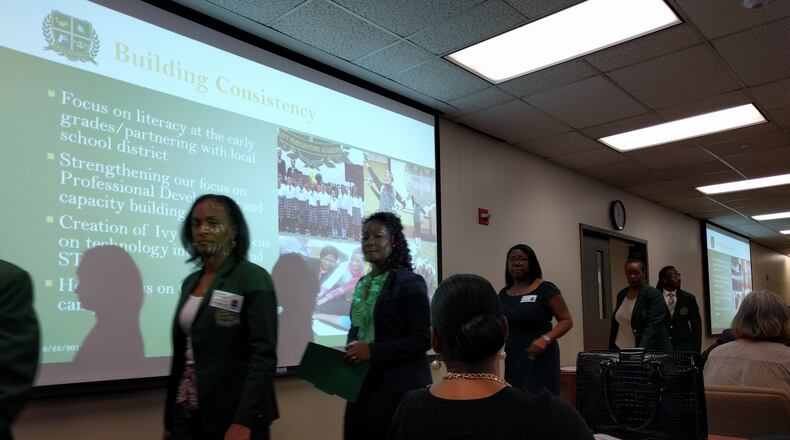Ten state charter schools that collectively enroll thousands of students, many in metro Atlanta, met Wednesday with the state commission that gives them authority to operate, in what for some was a final chance for a course correction before their contracts are up for renewal.
The schools, most of them in metro Atlanta, failed to reach the goals in their charters, which typically expire every five years and must be renewed. Nonrenewal will mean closure unless they can find a local school district to sponsor them.
“We realize we are here today to address our poor performance,” said Stephanie Payne, principal of Du Bois Integrity Academy in Clayton County. Her hat-in-hand tone that was repeated by numerous school leaders during the presentations that followed. She said the school, one of about 60 that have operated under a charter from the state rather than from a local district, had learned from its past problems. Officials had taken corrective action and there’d been academic gains since the 2015-16 school year, she said.
State charter school officials are working off old data. Schools have preliminary results from last spring’s Georgia Milestones, the standardized state tests required by the federal government. But the final numbers won’t be released for months, probably in October.
Those numbers will make or break some of these state charter schools when the State Charter Schools Commission decides whether to renew their charters during the next school year.
Unlike some others that presented Wednesday, Du Bois is only midway through its contract and still has time to improve. But commissioner Tony Lowden, who was named by Gov. Nathan Deal to the seven-member panel of political appointees, sounded like an unhappy boss during a job review. He noted that the school had scored one out of a possible 100 points on the commission's academic "framework," a sort of report card based on the test results. It also earned an "F" from the Governor's Office of Student Achievement, a watchdog agency that boils down the more nuanced College and Career Ready Performance Index, a grab bag of academic and other measures generated by the Georgia Department of Education after it releases the test results.
If Du Bois were a “normal regular” public school and not a charter, Lowden said, “there’d be some people saying ‘hey we need to close the school.’”
Charter schools operate independently with public funding and must meet academic and other performance benchmarks to maintain their charters. State charter schools differ from locally-authorized charter schools in that they do not get local tax dollars and they answer to the state commission instead of a local school district. The State Charter Schools Commission was established in 2013 by a 2012 constitutional amendment. Opponents feared such an agency would rush headlong into charter school approvals, but this commission has been selective, thorough and cautious, so far.
Some schools, such as Ivy Preparatory Academy, a charter operation in Gwinnett and DeKalb counties, earned praise for their results. “Thank you for the positive news,” outgoing commission chair Jennifer Rippner, another of the governor’s three appointees, said after the Ivy Prep leaders spoke. (Rippner is stepping down from the commission, and commissioner Tom Lewis, who has been serving as one of Lt. Gov. Casey Cagle’s two appointees, was selected Wednesday to succeed her as chair; House Speaker David Ralston also has two appointees.)
Georgia Cyber Academy, an online school that is the single largest public school in the state, with 14,000 students enrolled last fall dropping to 13,000 in the spring, said internal reports showed double digit gains in the percentage of students passing some of the state tests last spring.
During a similar review last year, the school leadership made a confrontational presentation that, commissioners complained, focused on criticism of the state's school grading system rather than on the school's plans for improvement. Georgia Cyber Academy went on to earn an "F" when the results were released for the 2015-16 school year. This time, the school's leadership struck a conciliatory tone. "We weren't where we needed to be," conceded board chairman Ryan Mahoney. He enumerated the subsequent changes: there's a new interim head of school, teachers were given contracts that reduced turnover, more teachers were hired to reduce the ratio of students to teachers, a new computerized learning system was installed and more computers were purchased for students, some of whom had been sharing.
The official 2016-17 academic results won’t be out until later this year, but the commission’s executive director, Bonnie Holliday, whose staff will recommend whether to renew the school’s charter after analyzing the DoE’s 2016-17 numbers this fall, was impressed by the presentation.
“It sounds like you all are taking some steps to make some changes that needed to be made,” she said.
But others got grim news. After the leaders of Utopian Academy for the Arts, in Clayton, said they hoped to boost their performance by redoubling their fundraising and long-range planning, commission vice chair Paul Williams, another Cagle appointee, threw the equivalent of cold water at them. It’s too late for money and planning, he said. “You’re in a crisis mode.”
Commissioners were also dubious about the prospects for Graduation Achievement Charter High School, an online and “bricks and mortar” school with locations in Atlanta, Augusta and Savannah.
The school has earned an "F" four years in a row, but Superintendent Monica Henson said that's because the state's grading system doesn't work for schools that enroll "alternative" students, typically booted from regular schools due to disciplinary issues, and that's who she serves. Holliday and some of her commissioners were unconvinced, but Henson told them it didn't really matter: she said she's in talks to obtain a charter from a local district rather than renewing with the state.
When Holliday asked what other data the commission should review that would cast the school in a better light, Henson said she didn’t know: “All I can say is there’s a robust market out there for the work that we do.”
The schools and their scores:
• Du Bois Integrity Academy, in Riverdale, Clayton County: F
• Foothills Education Charter High School, multiple locations in east middle Georgia, near Athens: F
• Ivy Preparatory Academy at Gwinnett, in Norcross, Gwinnett County: D
• Ivy Preparatory Academy at Kirkwood for Girls, in Atlanta’s Kirkwood neighborhood, DeKalb County: F
• Utopian Academy for the Arts, in Riverdale, Clayton: F
• Georgia Cyber Academy, online with statewide enrollment, including all metro Atlanta counties: F
• International Charter School of Atlanta, in Roswell, Fulton County: C
About the Author
Keep Reading
The Latest
Featured


